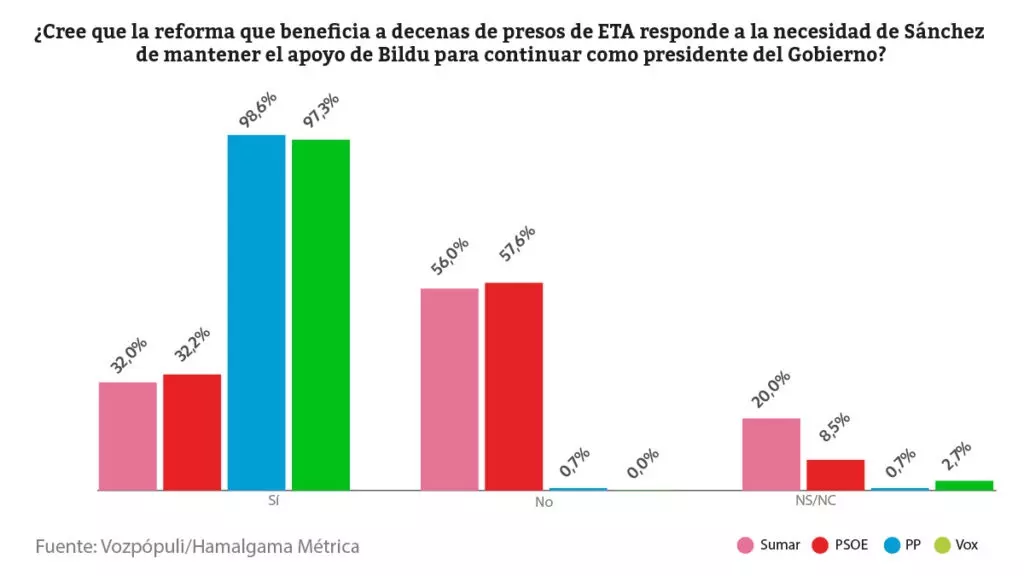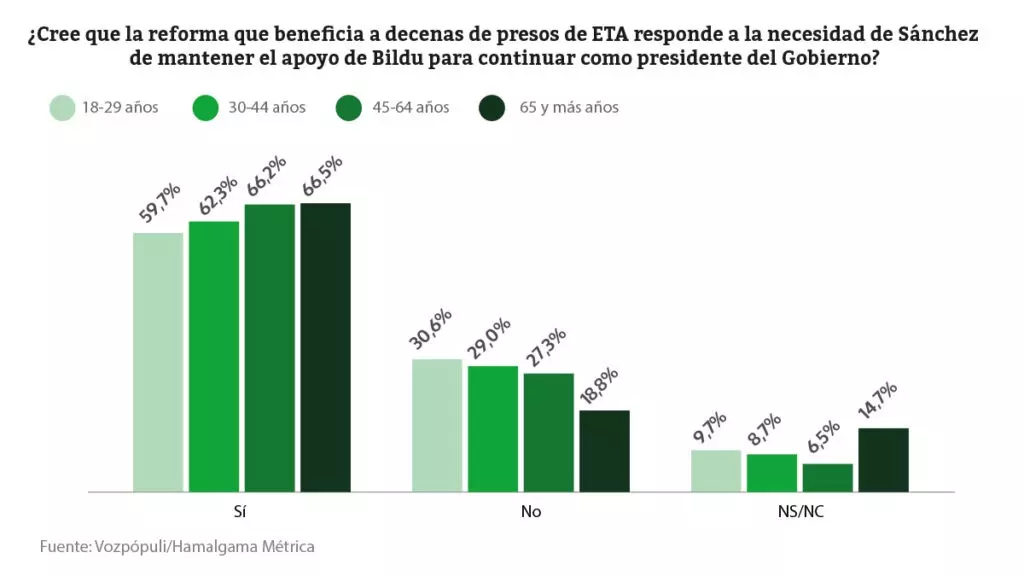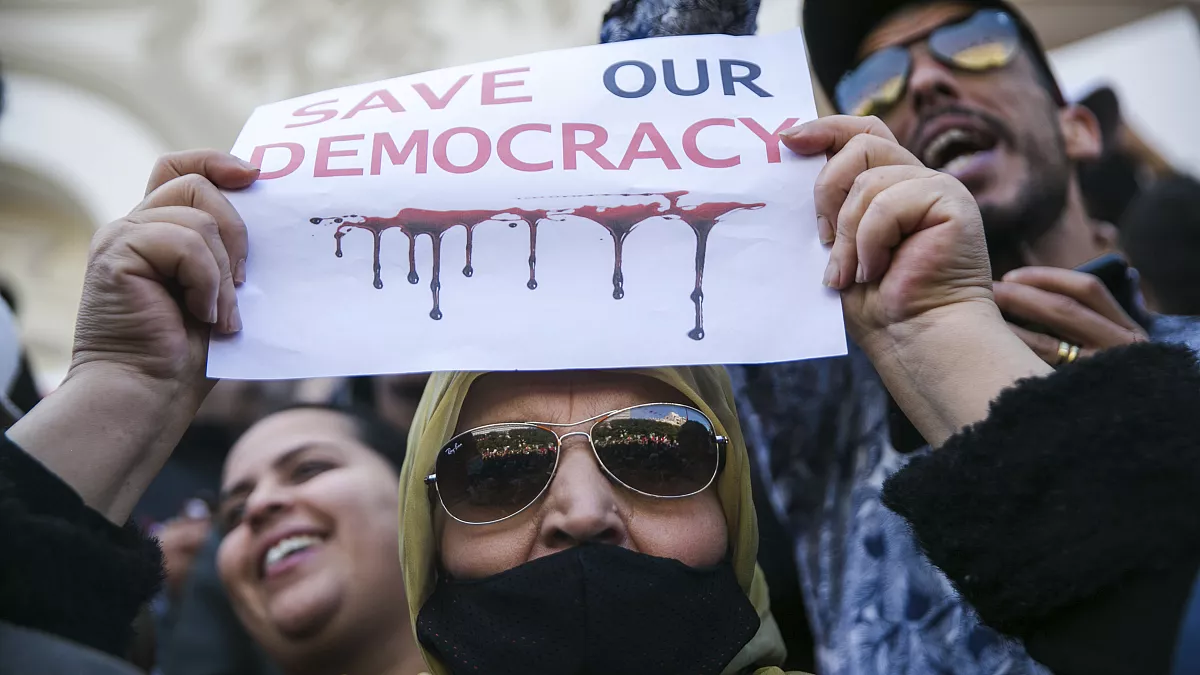In recent surveys, a significant 65% of Spaniards express the belief that Prime Minister Pedro Sánchez’s government is favoring prisoners associated with the Basque separatist group ETA. This sentiment reflects deep-seated concerns regarding Sánchez’s policies and their potential implications for national security and justice. The controversy surrounding ETA, which was responsible for numerous acts of violence during its campaign for independence, continues to polarize Spanish society. As debates intensify over reconciliation and the treatment of former militants, the perception that the current administration may be lenient towards ETA prisoners raises questions about the balance between justice, political strategy, and public opinion in contemporary Spain.
The PSOE and Sumar have recently introduced a controversial initiative in the Congress of Deputies that is set to benefit approximately forty ETA prisoners by reducing their sentences. This move has ignited a fierce backlash, particularly from opposition parties like the Partido Popular and Vox, who were caught off guard by the proposal and ultimately voted in favor of it. Prime Minister Pedro Sánchez has not publicly clarified his motivations for endorsing this measure. Still, a substantial 64.6% of Spaniards believe it is a concession to the Basque nationalist party EH Bildu aimed at securing their support for his government.
This perception stems from a survey conducted by Hamalgama Métrica for Vozpópuli following the recent controversy. The initiative is rooted in the transposition of European Directive 2019/884 concerning criminal records and information exchange among EU member states. In 2022, the Association of Victims of Terrorism (AVT) raised alarms that this directive could lead to immediate benefits for 44 ETA prisoners due to their prior imprisonment in France.
At that time, the Ministry of the Interior downplayed these concerns, asserting in correspondence with victim associations that there were no plans to amend regulations governing the legal consequences of convictions in other EU countries. However, two years later, the commitment made by the Ministry appears unfulfilled, as the PSOE and Sumar have moved forward with their initiative on penitentiary matters, directly affecting ETA prisoners. This situation highlights the ongoing complexities surrounding Sánchez’s governance, particularly in relation to the support of EH Bildu, which is crucial for his administration’s stability.
Breakdown by political preferences
The latest Hamalgama Métrica survey reveals a clear consensus among Spaniards regarding Prime Minister Pedro Sánchez’s motivations for promoting the recent initiative benefiting ETA prisoners. A significant majority believe that this move is aimed at appeasing EH Bildu to maintain his position in the Palacio de la Moncloa. Only 24.3% of respondents disagreed with this assessment, while 11.1% chose not to answer or expressed uncertainty.
The survey also highlights stark divisions based on political affiliation. An overwhelming 98.6% of Partido Popular (PP) voters connect Sánchez’s legislative reform with his alliances with EH Bildu, a sentiment echoed by 97.3% of Vox voters. These figures underscore the extent to which political preferences shape public perceptions of the government’s actions.

The divide in opinion among left-leaning voters is stark. Only 32.2% of PSOE supporters back Sánchez’s initiative to benefit ETA prisoners, while a significant 57.6% oppose it. Similarly, within Sumar, 32% are in favor, contrasted with 56% who reject the approach.
The controversy intensifies in light of a report from the Association of Victims of Terrorism (AVT), which indicates that the measure could lead to the release of convicted terrorists with gruesome criminal records by 2025. Notable among these is Xabier García Gaztelu, alias Txapote, who was convicted of twelve murders, including those of Gregorio Ordóñez, Miguel Ángel Blanco, Fernando Múgica, Fernando Buesa, and José Luis López de la Calle.
Additionally, terrorists such as José Javier Arizcuren Ruiz, alias Kantauri, and historical figures from ETA, like María Soledad Iparraguirre, alias Anboto, and Juan Carlos Iglesias Chouzas, alias Gadafi, would also benefit from this initiative.
This decision has sparked significant outrage among victim advocacy groups. A particularly poignant moment occurred when Maite Araluce, president of the AVT, publicly confronted Interior Minister Fernando Grande-Marlaska at an institutional event. She criticized him for misleading victims in an email two years prior, in which he assured them that there would be no benefits for ETA prisoners, stating, “Stop lying to us; you have no shame.”

Dignidad y Justicia expressed dismay over the recent passage of the reform in the Congress of Deputies, emphasizing the need for democratic parties to scrutinize such measures closely. “More than ever, democratic parties must pay attention to the small print. This government cannot be trusted,” remarked Daniel Portero, president of the association. Consuelo Ordóñez, president of Covite, labeled the initiative as “a new outrage” against terrorism victims.
The sentiment among Spaniards is clear, with 64.6% believing the initiative serves a specific purpose: to appease EH Bildu so that Pedro Sánchez can retain power.
Hamalgama Survey Fact Sheet
- Universe: Spaniards aged 18 and over.
- Sample Size: 1,000 interviews.
- Sampling Error: 3.16% for the entire sample, with a confidence level of 95.5%.
- Methodology: CATI (Computer-Administered Telephone Interview) conducted via mobile and landline phones.
- Sampling Procedure: Multi-stage, stratified by clusters, selecting primary sampling units (municipalities) and proportionally randomizing final units (individuals) by age and gender.
- Stratification: Crosses provinces with habitat size, categorized into four groups:
- Fewer than 2,000 inhabitants.
- 2,001 to 10,000 inhabitants.
- 10,001 to 50,000 inhabitants.
- More than 50,000 inhabitants.
- Fieldwork Dates: October 8-11, 2024.
Frequently Asked Questions
What does the survey reveal about public opinion on Sánchez’s initiative?
The survey conducted by Hamalgama Métrica indicates that 65% of Spaniards believe Prime Minister Pedro Sánchez’s government is favoring ETA prisoners to secure the support of the Basque nationalist party EH Bildu.
What specific initiative is being discussed?
The initiative involves a legislative reform that would benefit around forty ETA prisoners by reducing their sentences. This move has sparked significant controversy and debate in Spain.
How do political affiliations influence opinions on this issue?
Opinions are sharply divided along party lines. Nearly all voters from the Partido Popular (PP) and Vox see the connection between Sánchez’s initiative and his dealings with EH Bildu. In contrast, support for the initiative is much lower among PSOE and Sumar voters.
What are the concerns raised by victim advocacy groups?
Groups like the Association of Victims of Terrorism (AVT) have expressed deep concerns that the reform could lead to the release of convicted terrorists with serious criminal records, which they see as a betrayal of the victims of terrorism.
How did the government justify the initiative?
The government needs to provide a clear justification for the initiative, leading to speculation that it is primarily aimed at maintaining political support from EH Bildu.
What methodology was used in the survey?
The survey included 1,000 interviews conducted via telephone, with a sampling error of 3.16%. It utilized a stratified sampling method to ensure a representative demographic distribution.
What are the potential implications of this initiative?
The initiative may have far-reaching implications for public trust in the government, the treatment of victims of terrorism, and the political landscape in Spain, particularly regarding relations with nationalist groups.
When was the survey conducted?
Fieldwork for the survey took place from October 8 to October 11, 2024.
Conclusion
The finding that 65% of Spaniards believe Prime Minister Pedro Sánchez is benefiting ETA prisoners underscores a significant concern regarding his government’s approach to sensitive issues of justice and national reconciliation. This widespread perception reflects not only apprehension about the treatment of individuals associated with a violent past but also suspicions about Sánchez’s political motivations, particularly his reliance on the support of EH Bildu to maintain power.
The division in public opinion, especially among different political affiliations, highlights the polarized nature of contemporary Spanish politics. For many, the initiative raises critical questions about trust in democratic institutions and the balance between reconciliation and justice for victims of terrorism. As the government navigates this contentious landscape, the implications of public sentiment could influence both political discourse and future policymaking in Spain.



